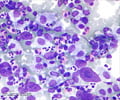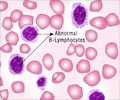Causes & Risk Factors of Chronic Lymphocytic Leukemia
Although several factors have been implicated, it is still not known why one person develops CLL while another does not.
The cause(s) of CLL is by far unknown.
- Hereditary factors: First-degree relatives of a patient, such as siblings and offsprings, have a 6-7-fold chance of acquiring the disease. They also have a 2-fold chance of developing Hodgkin’s or non-Hodgkin’s Lymphoma. Puplications in 2007 indicate that researchers have identified the first inherited gene mutation that increases an individual's risk for CLL.
However, the majority of CLL cases are not inherited. Only a small section of individuals with this kind of leukemia have a family history.
- Immunologic defects: Disorders, like Ataxia-telangiectasia or acquired agammaglobulinemia make an individual more prone to develop CLL.
- Age: CLL is more common among the elderly, so age is considered a major risk factor.
- Environmental factors:
- Herbicides, such as the defoliants used in the Vietnam War, have been implicated as a cause of CLL.
- Certain insecticides are also suggested to be causative agents.
CLL is not known to be associated with virus, radiation exposure or with carcinogenic chemicals, like benzene.











